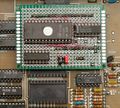7D01/Repairs: Difference between revisions
No edit summary |
No edit summary |
||
| (4 intermediate revisions by the same user not shown) | |||
| Line 7: | Line 7: | ||
==Bad ROMs== | ==Bad ROMs== | ||
[[File:Tek DF1 ROM_piggyback.jpg|thumb|300px|right|Piggyback ROM board | [[File:Tek DF1 ROM_piggyback PCB.jpg|thumb|300px|right|Piggyback ROM board in place (click to enlarge)]] | ||
Old mask ROM chips frequently fail, e.g. due to electromigration problems. Unfortunately, the DF1 CPU board uses 2k×8 ROMs with pre-JEDEC pinouts (see [[Mostek MK31000]]) so there are no easy in-socket replacements. The expansion ROM in the DF2 should be compatible with a 2516 EPROM. | Old mask ROM chips frequently fail, e.g. due to electromigration problems. Unfortunately, the DF1 CPU board uses 2k×8 ROMs with pre-JEDEC pinouts (see [[Mostek MK31000]]) so there are no easy in-socket replacements. The expansion ROM in the DF2 should be compatible with a 2516 EPROM. | ||
However, there are pin headers P207, P208, P209 and P210 next to the CPU, originally used to connect the memory daughterboard or a test system, that make it easy to add a small custom piggyback board with a decoder and a more modern E(E)PROM. An 8k×8 chip (2764, 2864) is sufficient to hold the 6kB needed for the DF2. As a bonus, this upgrades a DF1 to a DF2 if the missing front panel key is added as well (pads are present on the PCB). The stock ROM chips | However, there are pin headers P207, P208, P209 and P210 next to the CPU, originally used to connect the memory daughterboard or a test system, that make it easy to add a small custom piggyback board with a decoder and a more modern E(E)PROM. An 8k×8 chip (2764, 2864) is sufficient to hold the 6kB needed for the DF2. As a bonus, this upgrades a DF1 to a DF2 if the missing front panel key is added as well (pads are present on the PCB). The stock ROM chips must be removed prior to installing the piggyback board. | ||
<gallery> | <gallery> | ||
Tek DF1 DF2 ROM replacement board schematic.png | ROM piggyback board schematic (click to enlarge) | Tek DF1 DF2 ROM replacement board schematic.png | ROM piggyback board schematic (click to enlarge) | ||
Tek DF1 ROM_piggyback.jpg | Prototype | |||
Tek DF1 ROM_piggyback PCB.jpg | Production PCB | |||
</gallery> | </gallery> | ||
==Links== | |||
* [[Media:Tek DF1 ROM piggyback PCB.zip| ZIP file with EPROM image, Eagle BRD and SCH files for the ROM replacement board]] designed by [[User:Peter|Peter]] | |||
[[Category:Instrument repair reports]] | [[Category:Instrument repair reports]] | ||
Latest revision as of 10:33, 4 February 2022
Including repairs of DF1 and DF2 display formatters
IC socket problem
The 7D01, DF1, and DF2 are often affected by bad TI IC sockets.
Tek eventually had to run an unpublicized board exchange program for those instruments due to the high failure failure rates.
Bad ROMs

Old mask ROM chips frequently fail, e.g. due to electromigration problems. Unfortunately, the DF1 CPU board uses 2k×8 ROMs with pre-JEDEC pinouts (see Mostek MK31000) so there are no easy in-socket replacements. The expansion ROM in the DF2 should be compatible with a 2516 EPROM.
However, there are pin headers P207, P208, P209 and P210 next to the CPU, originally used to connect the memory daughterboard or a test system, that make it easy to add a small custom piggyback board with a decoder and a more modern E(E)PROM. An 8k×8 chip (2764, 2864) is sufficient to hold the 6kB needed for the DF2. As a bonus, this upgrades a DF1 to a DF2 if the missing front panel key is added as well (pads are present on the PCB). The stock ROM chips must be removed prior to installing the piggyback board.
-
ROM piggyback board schematic (click to enlarge)
-
Prototype
-
Production PCB


